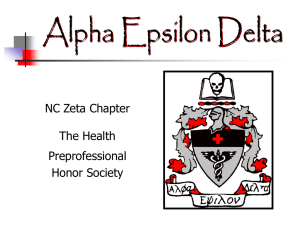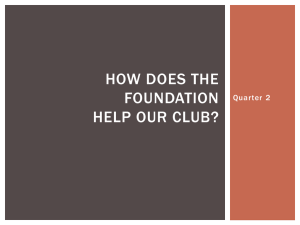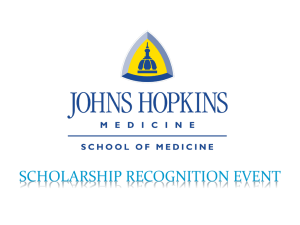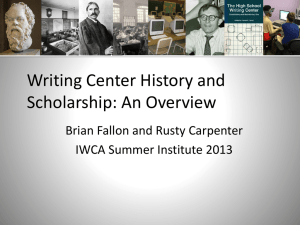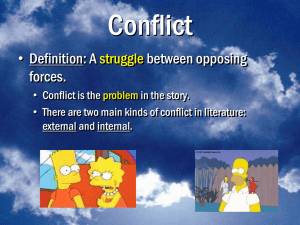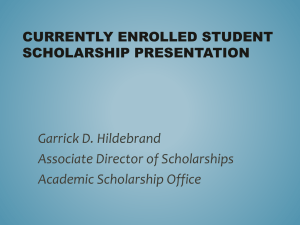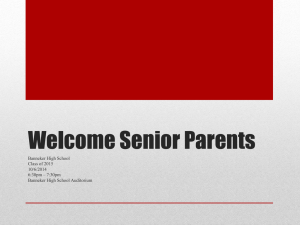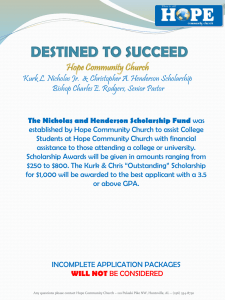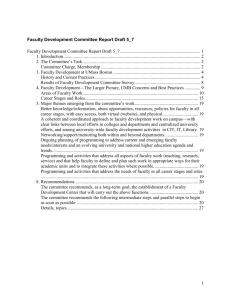Winning the Tenure Game
advertisement
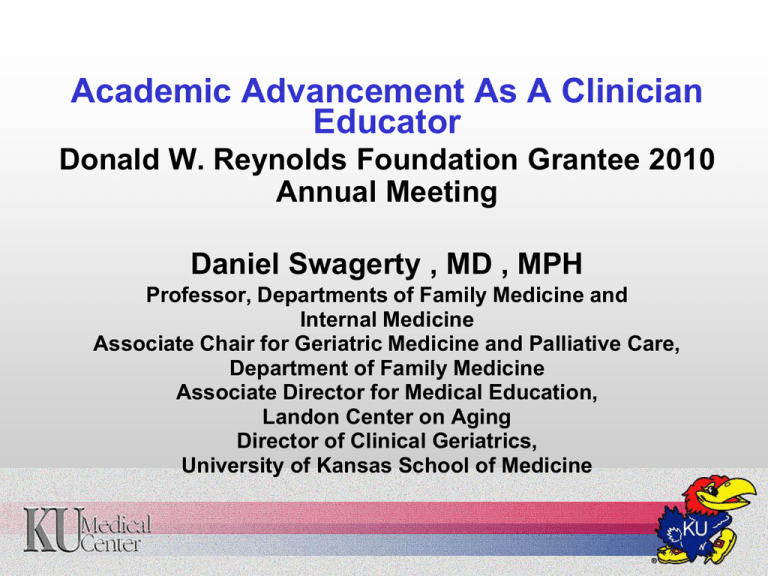
Academic Advancement As A Clinician Educator Donald W. Reynolds Foundation Grantee 2010 Annual Meeting Daniel Swagerty , MD , MPH Professor, Departments of Family Medicine and Internal Medicine Associate Chair for Geriatric Medicine and Palliative Care, Department of Family Medicine Associate Director for Medical Education, Landon Center on Aging Director of Clinical Geriatrics, University of Kansas School of Medicine Objectives Understand school of medicine faculty ranks and academic tracks Identify barriers and strategies for success in academic promotion for geriatric faculty List crucial issues for geriatric medicine faculty members in selecting and advancing in tenure-and non-tenure track positions Define how to manage a productive academic career through mentorship General Outline of Academic Promotion Regular fixed cycle with deadlines Formal hierarchical system Promotion depends on documentation Criteria usually based on achievements (quality and quantity) in all or some combination of education, scholarship, service. Definitions of education, scholarship and service, plus the relative influence of each may vary considerably by school, track, committee or individual. Ranks and Tracks Rank Track Assigned with a title when hired Defined by institution Unmodified or modified (descriptor) Clinical Research Tenured vs Non-Tenure Chair Decision Approved by Dean and Vice Chancellor Rank Instructor Assistant Professor Associate Professor Professor Track Defines Job Responsibilities Teaching Scholarship Professional Service Academic Service Criteria for Promotion and Tenure Specific Professional and Academic Expections Tenure Track Deadlines Mandatory Tenure Date - 5 Years Probationary Period – 7 Years Renewed Annually Expectations for Promotion to Associate Professor Achieve mid-level productivity in all 4 areas by mandatory tenure date Dismissal can occur if tenure not acheived within probationary period Non-Tenure Track No specific time line for promotion Tenure not an issue No consequence of dismissal if promotion not achieved Expectations for Promotion to Associate Professor Vary by track Clinical Scholars Track Full-time faculty Unmodified title Rotating or fixed term (1-3 years) Responsibilities – Patient Care, Teaching and Scholarship Two Career Pathways Clinician Educator Clinician Investigator Clinical Scholars Track Promotion to Associate Professor Clinician Educator Mid-career acheivements in professional service, academic service, and teaching Early-career acheivement in scholarship Clinician Investigator Mid-career acheivements in professional service, academic service, and scholarship Early-career acheivement in teaching Developing a Successful Program of Scholarship Scholarship = Intellectual Activity + Peer Validation + Public Dissemination School guidelines may specify type and quantity of scholarship Derived from your own strengths, interests and routine activities Be aggressive and realistic in activity and documentation Developing a Successful Program of Scholarship Conduct scholarship that counts Seek meaningful peer evaluation and outcomes of teaching Select meaningful and time-efficient service commitments Seek colleagues and activities outside department and school Developing a Successful Program of Scholarship Understand the process, regulations and guidelines Research how these are actually interpreted and implemented Values of P&T reviewers Seek regular evaluation by departmental chair/division chief, departmental P&T committee chair, and mentor Seek written assessment and feedback Developing a Successful Program of Scholarship Rules of the Process The school makes the rules ! If it’s not written down, it wasn’t done. Deadlines are real ! Strategies for Success Start Early Take it Seriously Get Help Barriers to a Successful Program of Scholarship Status of Geriatrics “ We have a faculty for Geriatrics ? ” “ We are not worthy. ” Service Commitments Highly Active with Low Productivity Mentorship A FACULTY MEMBER'S CAREER IS HIS OR HER RESPONSIBILITY MENTORING IS DESIGNED TO HELP YOU BECOME SUCCESSFUL IN MAKING THE APPROPRIATE DECISIONS TO ADVANCE YOUR CAREER. MERIT, ADVANCEMENT AND/OR PROMOTION ARE ASSESSED ACCORDING TO THE MISSION CRITERIA OF EACH ACADEMIC TRACK IN THE SCHOOL OF MEDICINE Mentorship – 4 Critical Goals Managing a productive academic career Support your own academic career needs and goals, while Supporting the department’s and institution’s missions and goals. Understanding the formal (and informal/implicit) values, policies and operating procedures in academic medicine, including Criteria for advancement and recognition in your field How the merit and promotion system works Developing and sustaining a network of professional colleagues within and outside of your department and institution. Learning where to go for advice, help and training. Mentoring Definition - "Mentoring" comes in all forms and varies based on the philosophy of who you ask. The style of mentoring is a personal preference. Purpose - Guide junior faculty to be successful academicians and ultimately to be promoted Types - Informal and Formal Mentoring - Informal Project/problem Oriented “On the Fly” Address a concern, problem, "how-to" solution Discuss immediate needs Get answers Solve problems Assists with reaching project goals Promotion is supported through project assistance Mentoring – Formal Career Oriented Formalized relationship with a senior colleague Regularly scheduled meetings Frequency deemed helpful by both parties Overall and Ongoing Career Assessment Determine if daily activities support career goals Assess progress regarding promotion Teaching Scholarship Professional Service Academic Service Conclusions : Developing a Successful Academic Career Know the system Start early Ask the right people Mentorship – Formal and Informal Conclusions : Developing a Successful Academic Career Document everything Communicate uniqueness and value Work hard but also work smart Beware of paranoia, myths, and verbal promises or reassurances
